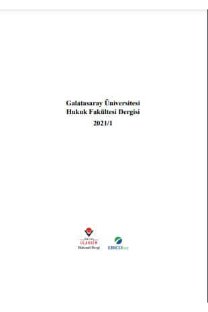PURPOSIVE INTERPRETATION(*) In the Footsteps of Aharon Barak
AMAÇSAL YORUM Aharon Barak’ın Ġzinde
___
BARAK Aharon, Purposive Interpretation in Law (tr. S. Bashi), Princeton University Press, Princeton; Oxford, 2005.BIX Brian, “Questions in Legal Interpretation” in Andrei Marmor (ed), Law and Interpretation: Essays in Legal Philosophy, Oxford University Press, 2006.
BYDLINSKI Franz, Juristische Methodenlehre und Rechtsbegriff, 2nd edn, Springer Verlag Wien-New York, 2011.
DURAL Mustafa/SARI Suat, Türk Özel Hukuku Cillt I: Temel Kavramlar ve medeni Kanunun BaĢlangıç Hükümleri, 9. Baskı, Filiz Kitabevi, Ġstanbul, 2014.
DWORKIN Ronald, “Law as Interpretation”, Texas Law Review, Vol. 60, No. 3, 1982, pp. 527-550, HeinOnline, (Access Date: 22.11.2020).
DWORKIN Ronald, Law’s Empire, Belknap Press of Harvard University Press, 1986.
ENGISCH Karl, Einführung in das juristische Denken, Thomas Würtenberger and Dirk Otto (ed), 11th edn, Kohlhammer, Freiburg, 2010.
FORSTMOSER Peter/VOGT Hans-Ueli, Einführung in das Recht, 4th edn, Stämpfli Verlag AG, Bern, 2008.
GÖZLER Kemal, Hukuka GiriĢ, 17. Baskı, Ekin Basım Yayın Dağıtım, Bursa, 2020.
GÜNEġ, Ahmet M., Hukuk Metodolojisi, 3. Baskı, Ekin Basım Yayın Dağıtım, Bursa, 2020.
HAMANN Wolfram, Juristische Methodik, 8th edn, Karin Hamann, Essen, 1994.
HĠRġ Ernest E. Pratik Hukukta Metot, Volf ÇERNĠS (ed.), 4. Basım, Banka ve Ticaret Hukuku AraĢtırma Enstitüsü, Ankara 2005/IX.
IġIKTAÇ Yasemin/METĠN Sevtap, Hukuk Metodolojisi, Filiz Kitabevi, Ġstanbul, 2003.
LARENZ Karl, Methodenlehre der Rechtswissenschaft, 3rd edn, SpringerVerlag, Berlin; Heidelberg, 1975.
NELSON Caleb, “What Is Textualism?”, Virginia Law Review, Vol.91: 347 2005, pp.347-418,
OĞUZMAN, M. Kemal/BARLAS Nami, Medeni Hukuk: GiriĢ, Kaynaklar, Temel Kavramlar, 21. Bası, Vedat Kitapçılık, Ġstanbul 2015.7
POTACS Michael, Rechtstheorie, 2nd edn, UTB GmbH, Wien, 2019.
RĠESENHUBER Karl, “Die Auslegung” in Riesenhuber (ed), Europäische Methodenlehre: Grundfragen der Methoden des Europäischen Privatrechts, Band 2, De Gruyter, Berlin, 2006.
SEROZAN Rona, Medeni Hukuk: Genel Bölüm/KiĢiler Hukuku, 6. Bası, Vedat Kitapçılık, Ġstanbul, 2015.
SMITH Peter J. “Textualism and Jurisdiction”, 108 Colum. L. Rev. 1883 (2008),
SÖZER Ali Nazım, Hukukta Yöntembilim, Beta, Ġzmir, 2008.
ZIPPELIUS Reinhold, Juristische Methodenlehre, 11th edn, C.H. Beck, München, 2012.
- ISSN: 1303-6556
- Yayın Aralığı: Yılda 2 Sayı
- Başlangıç: 2002
AĠLE KONUTUNA ĠLĠġKĠN KORUMANIN EVLĠLĠĞĠN ÖLÜMLE SONA ERMESĠNDEN SONRAKĠ ETKĠLERĠ
EDĠNĠLMĠġ MALLARA KATILMA REJĠMĠ ÇERÇEVESĠNDE ANONĠM ORTAKLIK PAYINA DAĠR BAZI HUSUSLAR
ĠGORTACININ HALEF SIFATIYLA AÇTIĞI RÜCU DAVALARINA ĠLĠġKĠN BAZI KARARLAR
Onur KAPLAN, Güneş Karol IŞIKLAR
AVRUPA ĠNSAN HAKLARI SÖZLEġMESĠ’NDE MEDYA ÖZGÜRLÜĞÜ: KAPSAMI VE SINIRLAR
TÜRK CEZA MUHAKEMESĠNDE SERĠ MUHAKEME USULÜ VE MUKAYESELĠ HUKUKTAKĠ BENZER USULLER
